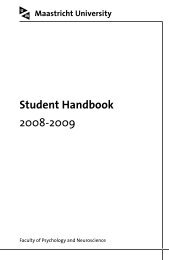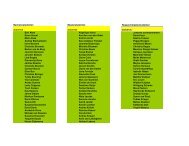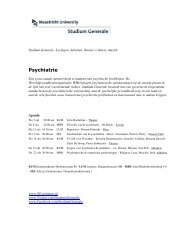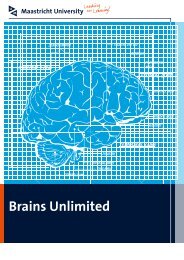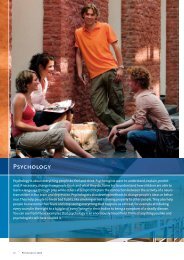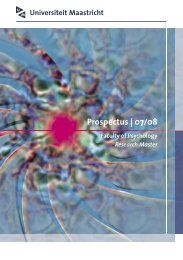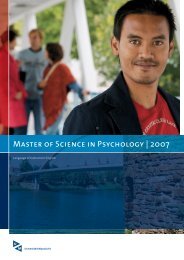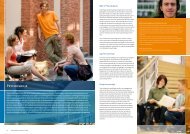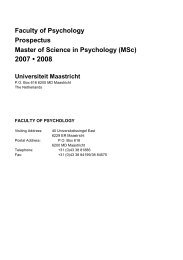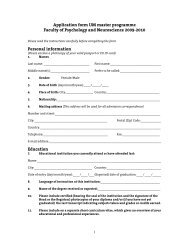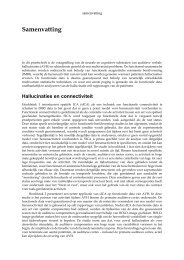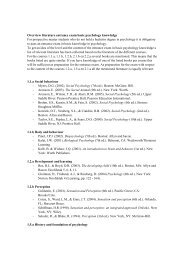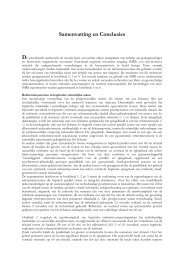Prospectus | 08/09 - Psychology and Neuroscience - Maastricht ...
Prospectus | 08/09 - Psychology and Neuroscience - Maastricht ...
Prospectus | 08/09 - Psychology and Neuroscience - Maastricht ...
Create successful ePaper yourself
Turn your PDF publications into a flip-book with our unique Google optimized e-Paper software.
<strong>Prospectus</strong> Research Master <strong>Psychology</strong> 20<strong>08</strong> • 20<strong>09</strong><br />
16<br />
The curriculum includes theoretical courses, colloquia, skill trainings, <strong>and</strong> workshops<br />
followed throughout year 1 <strong>and</strong> the beginning of year 2. These ensure that students<br />
acquire a broad intellectual foundation before choosing a research topic for the<br />
remainder of the programme. Core courses form the backbone of the chosen<br />
specialization. To increase awareness <strong>and</strong> appreciation of the value of different research<br />
approaches, the course ‘Interdisciplinary Perspectives’ addresses two broad topics each<br />
year, from the perspective of each of the four specializations. Colloquia are designed to<br />
integrate topics that are of general interest to the fields of psychology <strong>and</strong> neuroscience.<br />
The colloquia are open to all students, thus fostering interdisciplinary interaction. Skill<br />
trainings provide students with the necessary practical knowledge for research in<br />
experimental <strong>and</strong> applied settings, whereas specialized workshops provide the necessary<br />
foundation for conducting the Master’s thesis research <strong>and</strong> advanced skills for a future<br />
scientific or any other related career.<br />
The Research Master’s (MSc) programme is equivalent to 120 European credits.<br />
Core courses<br />
In the core courses students become acquainted with the most important theories,<br />
models, techniques, <strong>and</strong> analytic methods in the domains of Cognitive <strong>Neuroscience</strong>,<br />
Fundamental <strong>Neuroscience</strong>, Neuropsychology, <strong>and</strong> Psychopathology. The courses are<br />
given in a Problem-Based learning (PBL) or seminar format. Under the guidance of an<br />
experienced faculty member, students meet in groups for in-depth discussion of current<br />
research issues pertinent to the central theme of the course, based on assigned readings<br />
of cutting-edge articles. Course credits (2 to 4 credits per course, depending on its length)<br />
<strong>and</strong> grades are assigned on the basis of assessments that may include participation,<br />
written papers <strong>and</strong>/or presentations or exams.<br />
Two Advanced Statistics courses (with a total of 5 credits) are shared by all specializations.<br />
They consist of a mixture of lectures, h<strong>and</strong>s-on training, <strong>and</strong> student-centered meetings,<br />
designed to acquaint the student with the most important advanced methods with widespread<br />
research applications. The final grade is based on a multiple-choice format exam.<br />
Interdisciplinary Perspectives course<br />
This course, required for all students, consists of two series of four lectures each. The<br />
lectures on each topic are given by faculty members from the four specializations, with<br />
the aim of illustrating different perspectives on a shared research theme. The course<br />
will demonstrate the richness of hypotheses, research designs, <strong>and</strong> methods that can<br />
be brought to bear on a given research theme, thus stimulating students to combine<br />
these different perspectives in their future research. Required readings, assigned by each<br />
lecturer, will be made available prior to the first lecture on a new theme. The final grade<br />
is the average score obtained on two exams, one following each series of four lectures (3<br />
credits).



